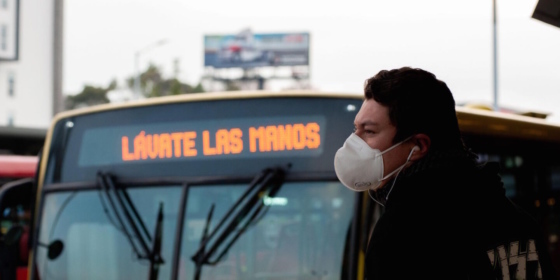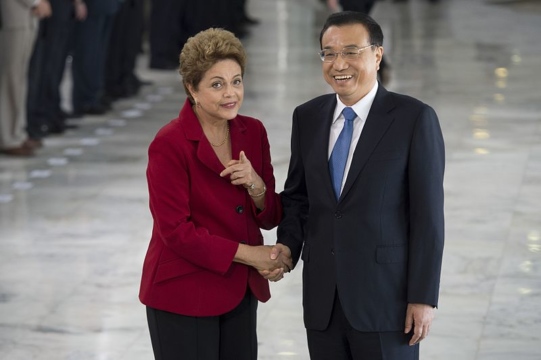
China’s Strategy in Brazil & the Southern Cone
What does China stand to gain from investing in Latin America’s energy projects? Where is China looking next in the region?
What does China stand to gain from investing in Latin America’s energy projects? Where is China looking next in the region?
President-elect Donald Trump has vowed to overhaul US energy and foreign policy in ways that could have important impacts on energy relations with Latin America and the Caribbean.
Regional integration, social inclusion, and the need for a more competitive business climate—discussed at the XVIII Annual CAF Conference
As global temperatures continue to rise with the global community stalled on any way to stop them, countries must prepare to adapt to increasingly volatile environmental conditions.
As the global financial crisis continues to alter US relations with the hemisphere, greater engagement in the region remains critical to US interests.
El Diálogo Interamericano preparó un informe titulado “El impacto de la política eléctrica estado-céntrica en México en el comercio, el clima y la economía”, el cual analiza los principales cambios ocurridos en la política energética de México y sus impactos en la inversión y en el medio ambiente. El informe fue presentado en un webinar el 18 de noviembre organizado por la Universidad Nacional Autónoma de México y el Real Instituto Elcano.
The US has introduced several measures to facilitate energy & infrastructure investment in Latin America. However, the impact will likely be constrained by the challenging investment environment in many Latin American countries, demonstrating the limitations for the US in competing with China’s centralized economic model.
In an interview for BNamericas, Lisa Viscidi discusses Joe Biden’s victory and how it might impact the US-Mexico energy relationship.
Lisa Viscidi, directora del programa de energía, cambio climático, e industrias extractivas, analizó las estrategias de las empresas petroleras estatales de América Latina encaminadas a reducir las emisiones directas en sus operaciones y sus estrategias para la transición energética en el evento PERÚ ENERGÍA DIGITAL 2020, organizado por Prensa Grupo.
Over the past two years, the government of Mexican President Andrés Manuel López Obrador has sought to strip away central aspects of the 2013 energy reform that increased private investment in the power sector and return control of the sector to state utility CFE. These moves will reduce needed investment in the sector and lead to higher electricity costs for Mexican industry and manufacturing, affecting employment, trade, and Mexico’s ability to meet its clean energy targets, according to this new report by the Inter-American Dialogue.
The State Department’s Bureau of Energy Resources held a webinar on September 9, 2020 on barriers and opportunities for private investment in Caribbean energy sectors, energy resource diversification, the impacts of Covid-19 on Caribbean energy markets, and US cooperation. Lisa Viscidi, director of the Energy, Climate Change & Extractive Industries Program at the Dialogue, moderated the event.
This policy brief examines the regulatory changes in Mexico’s electric power sector made under the López Obrador administration. The brief analyzes the broader implications for Mexico’s economy and its trade and economic relations with its key trading partner, the United States. A full report will be forthcoming in October 2020.
Lisa Viscidi, director of the Energy, Climate Change and Extractive Industries Program, sits down with S&P Global Platts to discuss Guyana’s newly inaugurated president and the implications for its oil future.
The National Council Area Chapter of the U.S. Association for Energy Economics (NCAC-USAEE) held a public online event on July 1, 2020 to discuss current challenges facing Venezuela’s energy sector, including US sanctions, declining crude output, gasoline shortages, and relations with Iran and Russia. Lisa Viscidi, Director of the Energy, Climate Change & Extractive Industries Program at the Dialogue, moderated the event and Risa Grais-Targow, Director of Latin America at Eurasia Group, appeared as the featured speaker.
In an interview with Diálogo Chino, Lisa Viscidi, director of the Energy, Climate Change & Extractive Industries Program, notes that the use of electric vehicles is growing throughout Latin America, but Covid-19 could stall progress.
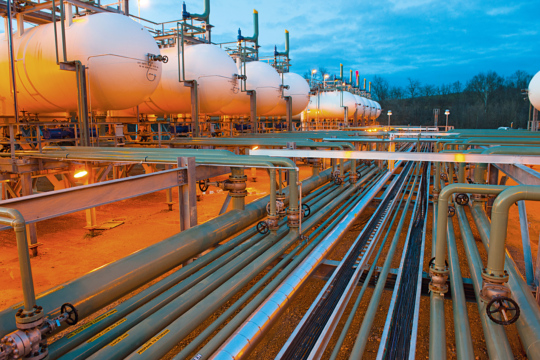
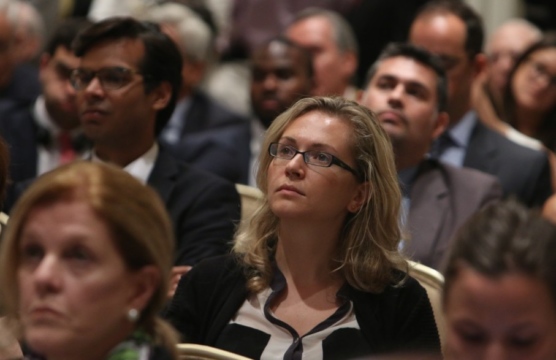 Video
Video
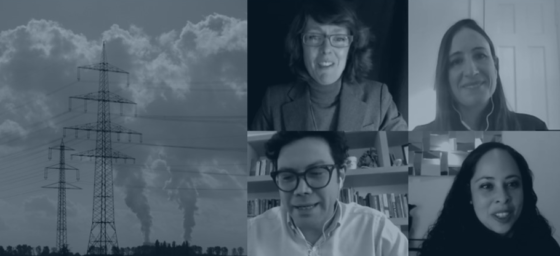 Video
Video
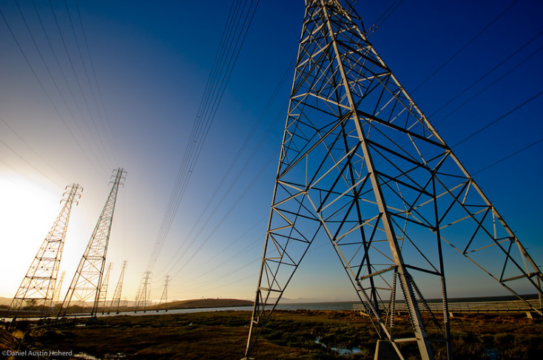
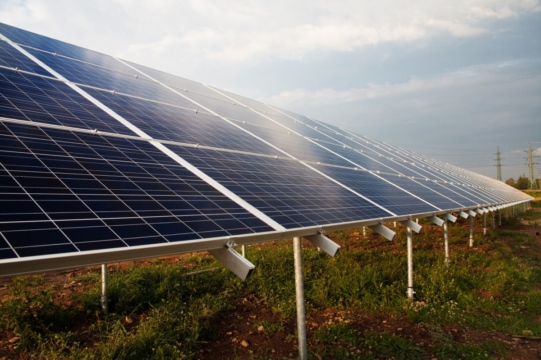
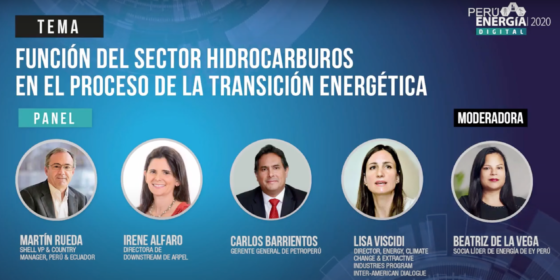 Video
Video
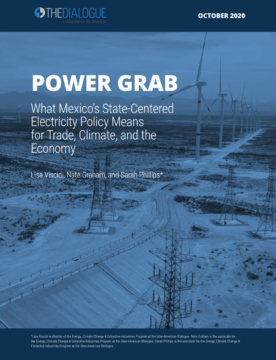
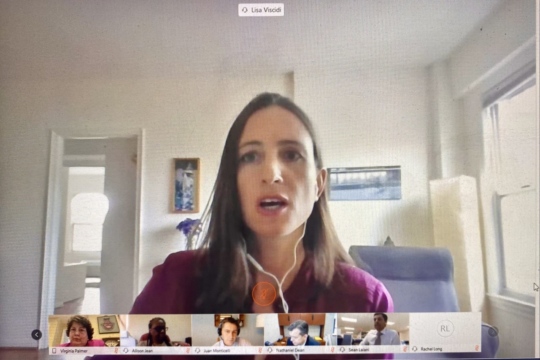 Video
Video
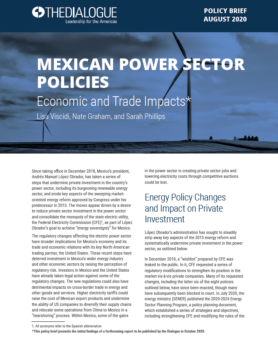
 Video
Video
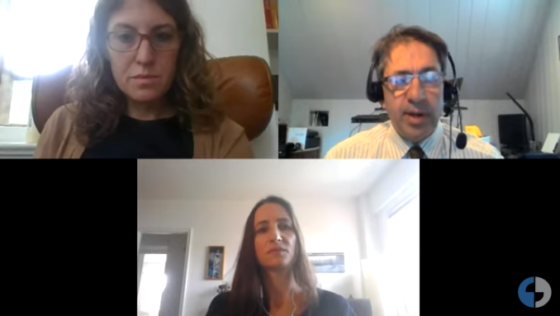 Video
Video
